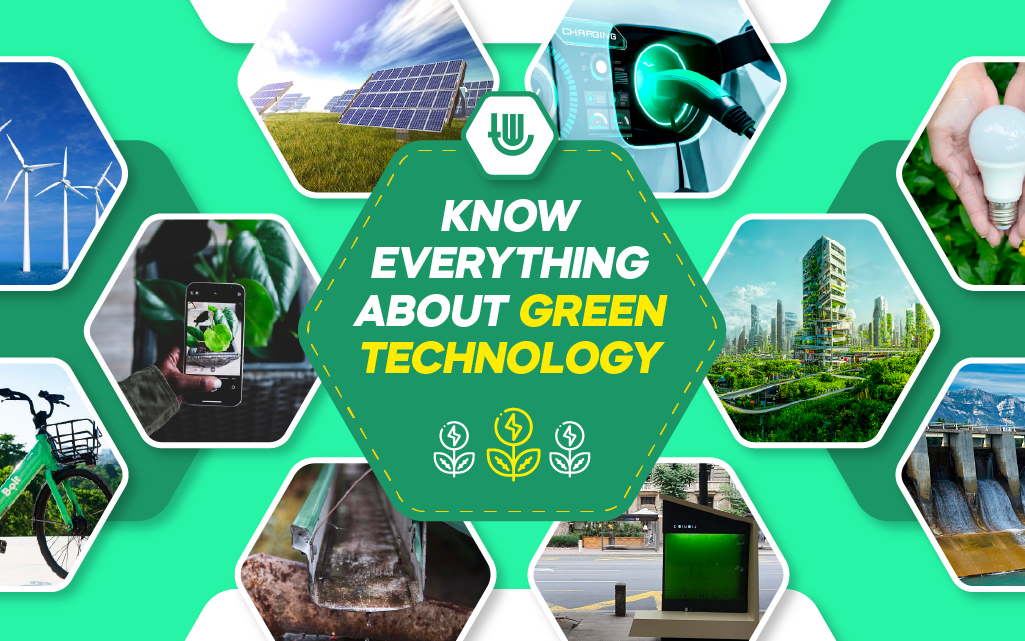
The realm of sustainable innovation has a long history that you might be made aware of. It has been in the form of thermal energy from underneath the earth’s surface and solar power to light fires with magnifying glasses. These solutions present from as early as the 7th century BC. And by keeping such examples in mind, people have spent a lot of time developing sustainable solutions for basic human requirements. This article is about Green technology will be a comprehensive understanding of sustainable technology, right from trends, importance, examples and benefits. Read on to learn more.
The world is heading towards Green Technology, where sustainability is the core idea—and eventually, making efforts to shape a better future for our planet. The above-mentioned examples were a part of our science project in schools, but slowly it develops an idea about how naturally available resources of energy are plenty for survival, if it is applied in the right manner.
What is Green Technology?
But what exactly is Green Technology? It is the amalgamation of scientific methods to find solutions to hazardous methods and replace them with eco-friendly means. In Green Technology, we emphasise creating sustainable products that can be disposed of in an eco-friendly manner. Some examples to be provided are the ones that we learn right from school- such as rainwater harvesting or solar electric panels for various household needs to name a few.
The goal primarily sought by green technology is to make sure that every product or service that is damaging the environment has an eco-friendly alternative.
Recent Trends in Green Technology
The scope of the Green Technology market is expected to soar significantly by 2030. Statistics mention a surge of 20.8% annually to make it a whopping 13.76 billion USD market.
Following are the sectors where we see sustainable technology heavily implemented:
Automobile Industry
The automobile industry adapted to green technology by resorting to EV vehicles. Thus, a significant reduction in greenhouse gas emissions was observed. This reduces carbon footprints, given that many households have one vehicle per house member, and replacing EVs with traditional gasoline machines can bring positive effects.
Government entities have proposed EV substitutes for public transportation, including buses, trains, and aeroplanes.
Electrical Industry
When manufacturing any tech gadget, it is essential to understand the amount of emissions the product makes. Purchasing an eco-friendly device produced via sustainable means is a revolutionary change in the electronics industry. These are also called Green Electronics, and LED lights are the best example, providing high efficiency and consuming low energy.
Waste Management
Implementing solutions that are environment-friendly at every stage, from collection, segregation, and disposal, are some recent implementations of waste management. Green technology in waste management ensures less wastage and energy consumption is involved- thereby reducing the emission of harmful chemicals into the environment.
Why is Green Technology Important?
While we see that the implementations of Green Technology have already begun, it is essential to understand why it is important and what benefits humankind can achieve in the long run. Statistically, the benefits of choosing sustainable technology are far more than the cons. Let’s have a quick look here.
Optimal utilisation of renewable energy sources
Green technology encourages the widespread use of renewable energy sources, including solar, wind, and hydropower, to reduce reliance on limited fossil fuels. This switch to clean energy improves energy security, provides a more sustainable energy future, and helps to combat climate change.
Lack of a polluted environment/ Mitigates environment pollution
By reducing hazardous emissions and pollutants, green technology attempts to improve air, water, and soil quality. By using eco-friendly practices and technologies, we can tackle air pollution, acid rain, and greenhouse gas emissions, which are harmful to both human health and the environment.
Reduced wastage
Green technology emphasises reducing waste and maximising resource efficiency through composting, recycling, and sustainable manufacturing practices. Green technology helps preserve natural resources and reduces the strain on ecosystems by curbing the unnecessary consumption and promoting circular economy principles.
Recyclable and improved efficiency
Green technology promotes the creation of systems and products that are resilient, long-lasting, and energy-efficient. We can reduce trash production and help move the economy towards by developing products with longevity and recycling in mind.
Improved Lifestyle and Well-Being
Green technology promotes a healthier environment, cleaner air, and water, further contributing to better public health outcomes, lower healthcare expenditures, and an overall higher standard of living. Additionally, green spaces and sustainable urban development result in more livable and resilient communities.
Disadvantages of Green Technology
Green technology has many advantages, but it also has certain drawbacks. First, some people and companies may be discouraged from implementing eco-friendly solutions due to their high initial implementation costs. Switching to green technology may necessitate substantial infrastructure and business procedure adjustments, potentially eliminating jobs in some sectors.
For commoners, implementing green technology can be about bringing a drastic change in the lifestyle where some of the convenient options might be eliminated.
Towards the conclusion
As we conclude on understanding Green Technology, known as sustainability technology, it is not rocket science or too complex. Once can contribute their bit towards an eco-friendly future by making minute changes in the routine and resorting to renewable energy sources as a driving force. Small activities such as rainwater harvesting, solar panels for energy, biomass for cooking, and waste separation for effective disposal can significantly impact the long run.

Author Bio: This article has been written by Rishika Desai, B.Tech Computer Engineering graduate with 9.57 CGPA from Vishwakarma Institute of Information Technology (VIIT), Pune. Currently works as Cyber Threat Researcher at CloudSEK. She is a good dancer, poet and a writer. Animal love engulfs her heart and content writing comprises her present. You can follow Rishika on Twitter at @ich_rish99.